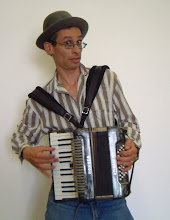From my Jewish Post series:
-------------------------------------------
“Bontshe Schweig” by I.L. Peretz is probably the most
well-known and widely discussed short stories in all of Yiddish literature. It
is the story of a humble and meek man who suffered in silence through all the
indignities of his miserable life, only to be greeted in the next world with
wild adulation by all the angels. His entry into heaven is a foregone
conclusion, but nevertheless his sins and virtues must be tallied up in a kind
of trial. First the advocate speaks, and it is only as he leads the tribunal
through one horrifying episode after another that Bontshe is able to convince
himself that they are actually talking about him. But even so Bontshe is afraid of what will happen when it is
the prosecutor’s turn to speak.
He can hardly remember the details of his past
life...what kinds of sins might he have forgotten about? But when the advocate
has finished and the prosecutor rises, he looks at the panel of angels and
begins:
“Rabossey…”; then pauses and
starts again, “Rabossey…er hât
geschwiggen. Well ich auch schweigen.” (He was silent…I will also be
silent.)
And then a gentle
voice begins to comfort him: “Bontshe
mein kind…in that other word your silence was not rewarded, but that was oylam ha-sheker; here, in oylam ha-emes you will receive your
reward”.
And then to his disbelief he is assured that whatever he asks for will
be his…anything!
The angels are waiting with baited breath to see what
Bontshe will ask for. Bontshe still doesn’t believe it. “Takeh?” he asks. “Sicher!”
he is reassured. “Nu”, he replies, õb asõ…will ich takeh alle täg inderfrüh (in
that case I would like every morning)…a
héisse boulkeh mit frische putter!”
And that’s where the story gets confusing. Because Peretz
doesn’t tell us how we are supposed to feel about this. All he says is: “Dayanim un malachim hâben arâb-gelâst die
köp verschämt; der kathoyger hât sich zelacht.” (Judges and angels hung
their heads in shame; the prosecutor laughed out loud.”)
What does it mean? People have been debating this question
ever since. Mock trials of Bontshe Shweig were once de rigeur wherever Yiddish literature was taught. Even translators
got into the act; in Nathan Ausubel’s “Treasury
of Jewish Folklore”, translator Hilda Abel gives this unbelievable
rendering: “…slowly, the judge and the angels
bend their heads in shame at this
undending meekness they have created on earth. Then the silence is shattered.
The prosecutor laughs aloud, a bitter laugh”. You don’t have to know much
Yiddish to see that she’s making most of that up. But she’s in line with the
general consensus: that the angles were appalled that life on earth was so
miserable that a man’s horizons and aspirations could become so pitifully limited.
I think people are missing the point. Bontshe wasn’t so
stupid. What was he supposed to ask for…seventy virgins and a boatload full of
gold? At least if you knew you were going to get a hot roll with butter first
thing in the morning, how bad could the rest of your day be?
I think the angels were disappointed because, like the Miss
America contestant who’s supposed to wish for World Peace, they expected
Bontshe, after that tremendous build-up, to wish for something great for all
mankind, perhaps even the coming of Mashiakh. (Pretty much the Jewish
equivalent of world peace, actually.) They were ashamed, and rightly so,
because they realized they had wanted him to wish for something that they wanted, not something that Bontshe
actually wanted. And I think that’s a pretty good lesson that a lot of
sanctimonious and moralizing people could take to heart even today.

6 comments:
This story has found its way into many literary anthologies, nothing to do with yiddish. It's one of my favorites as well. Peretz is enigmatic as usual. I often feel that I am that Bontche Shveig without the shveig part. Cheers.
Yes Pearl, you're right about the shveig part. Anyhow, I was doing occasional articles in the local Jewish weekly when I got it in my head to do something about Yiddish. My first article is here
http://marty-green.blogspot.ca/2013/10/the-genius-of-yiddish.html
and it goes on for a pretty good run. I think you gave me some advice on the next one in the series.
ps did you like my article about the Galois group of the nth cyclotomic polynomial? (just kidding)
as a child, I used to ask for World Peace in exchange for the afikomen
you should have run for Miss Brooklyn.
Mooooooooo ....
Post a Comment